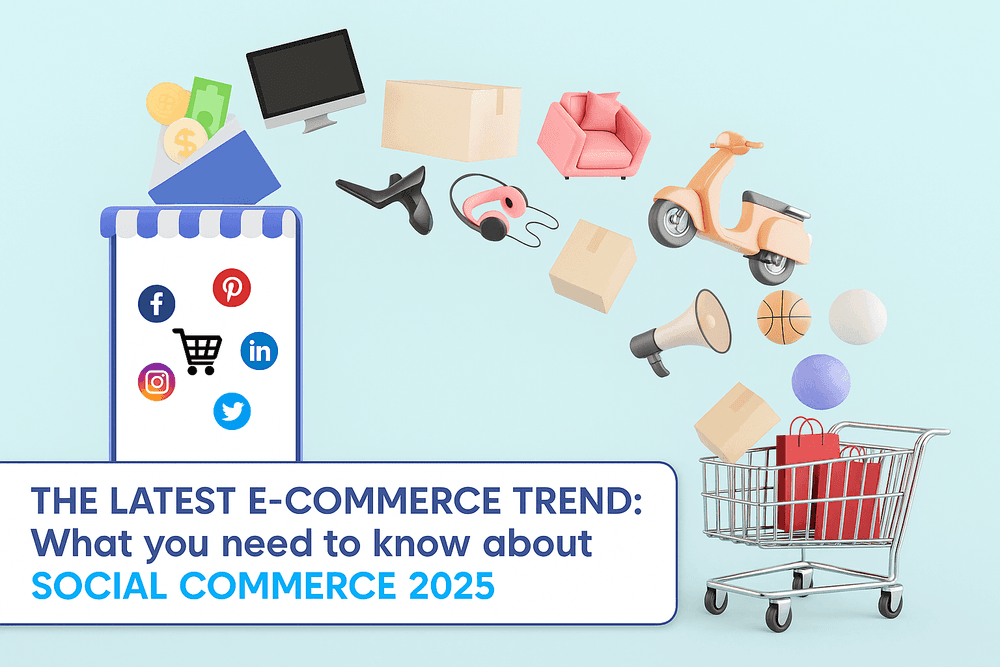
As e-commerce businesses globally are getting ready for the holiday season, one trend is shaking up the online shopping scene. Social commerce looks set to make an impact on e-commerce sales this season.
What Is Social Commerce?
Social commerce is the convergence of e-commerce and social media. Brands engaging in social commerce use social media platforms as vehicles to sell products and services. If your business relies on e-commerce sales, you are likely already involved in social commerce. However, are you maximizing the potential of this trend for your business?
Growth Opportunities
According to Statista, there were 80 million social buyers in the U.S. in 2020, which equals a 30% increase over 2019. Experts believe that the social commerce trend would have continued to grow without the pandemic but that the pandemic accelerated its growth.
Those 80 million buyers spent approximately $27 billion throughout 2020. Forecasts suggest that both Facebook and Instagram will remain at the forefront of social shopping in the U.S. in the coming years, with over 69 million and 47 million shoppers, respectively, by 2025.
Looking further ahead to 2026, social commerce in the United States is set to grow to nearly $80 billion. At that point, it would account for just over 5% of the country’s retail e-commerce sales.
How Your Business Can Take Advantage
Considering the growth forecast for social commerce and the growing use of social media, any business involved in e-commerce has the potential to benefit.
While it is important to ensure that your social commerce strategy is tailored to your brand, several tactics are suitable for most online retailers. These include user-generated content, working with influencers, and adding consumer calls to action to your posts.
Choosing The Most Suitable Platform
Another major consideration is your choice of platform. Facebook is currently the largest social media platform in the U.S., which is why your organization should consider it as a contender for your social commerce activity. The network has been forecast to attract more than 56 million buyers in 2021.
If you are a small or medium business, Facebook has even created a bespoke platform for companies like yours. Facebook Shops was launched in 2020 to help smaller businesses through the pandemic. Through this tool, you can bring your shopfront online for free. If e-commerce and social commerce are part of your strategy, this is an opportunity not to be passed by.
Do you do business on both Facebook and Shopify stores? Need a solution to combine selling power?
Instagram has been associated with influencer culture for years. Despite attracting fewer users overall compared to Facebook, if influencer marketing raises awareness for your brand, Instagram needs to be on your list of chosen platforms for social commerce.
The platform offers several tools to facilitate your sales. For years, brands have been encouraging potential customers to visit their biography for a link to their store. This has been an effective strategy to enable sales, but more recently, Instagram took things further by launching Instagram Checkout to make purchases easier. Since 2020, the social network has had a shop tab. This allows users to see and purchase in one single click products advertised by people, influencers, or brands they follow.
TikTok is a relatively recent addition to the choice of social media networks consumers have. In the three years since the platform was founded, it has not only grown exponentially, but brands have also benefitted from user-generated content leading to “consumer manias.” Some TikTok users have built a huge following based on their ability to sell a wide variety of products.
As a consequence, e-commerce giant Amazon added a column to its website listing items that recently went viral. TikTok has recognized the huge potential of its platform as an e-commerce facilitator and launched TikTok Shopping to offer sellers a wider array of solutions.
The Next Step
Social media marketing and social commerce are important pillars of your e-commerce strategy this season. With holiday shopping about to enter its busiest period of the year, it is worth investing in this trend.
As you are preparing posts and shopping messages, remember that the success of social media is built upon creating connections between people. Conversion into sales is an important measure of success, but considering engagement through sharing, commenting, and generally interacting with posts is equally valuable criteria.
Pay close attention to your tone of voice when you are engaging with customers. Experts have credited TikTok’s unprofessional feel as a major contributor to its sales success. Sales messages feel like they are spontaneous, trustworthy recommendations from friends rather than corporate, sponsored messages.
Online retail and e-commerce are permanently evolving. While online shopping statistics have grown across the board, partially accelerated by the pandemic, there are a few products that are firm favorites with online shoppers. If your company operates in one of the following fields, social commerce needs to be a priority for you: Accessories and apparel, consumer electronics, home décor, and cosmetics are leading the growth of social commerce.
Investing in social commerce activity for these products allows your business to increase sales and connect directly to customers. It is an excellent way to boost revenue and build long-term consumer relationships.

